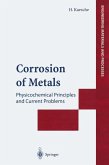People seldom enjoy corrosion. They usually perceive it as a nasty phenomenon with which they must cope. Yet many people, far from the corrosion field, come across it because of their professional duty. Lawyers, historians, doctors, architects, philosophers, artists, and archeologists, to name a few, may want or need to understand the principles of corrosion.
This volume explains this important topic in a lucid, interesting, and popular form to everybody: to students and young engineers who are only beginning their studies, to scientists and engineers who have dealt with corrosion for many years, and to non-specialists involved in corrosion problems.
The book uses a fresh writing style, with some new explanations relating to thermodynamics of oxidation of iron and mild steels in water, reversible and irreversible potential, solubility of oxygen in water and aqueous solutions of electrolytes, corrosion of metals in fuels, corrosion of storage tanks for fuels and their corrosion control, corrosion monitoring in practice, humanitarian aspects of corrosion science and technology (history of the evolution of knowledge about corrosion, relationships between corrosion and philosophy, corrosion and art). Many practical examples of various corrosion phenomena are given.
This volume explains this important topic in a lucid, interesting, and popular form to everybody: to students and young engineers who are only beginning their studies, to scientists and engineers who have dealt with corrosion for many years, and to non-specialists involved in corrosion problems.
The book uses a fresh writing style, with some new explanations relating to thermodynamics of oxidation of iron and mild steels in water, reversible and irreversible potential, solubility of oxygen in water and aqueous solutions of electrolytes, corrosion of metals in fuels, corrosion of storage tanks for fuels and their corrosion control, corrosion monitoring in practice, humanitarian aspects of corrosion science and technology (history of the evolution of knowledge about corrosion, relationships between corrosion and philosophy, corrosion and art). Many practical examples of various corrosion phenomena are given.
From the reviews:
"Corrosion is discussed in six chapters, beginning with corrosion mechanisms and the parameters which control it, followed by corrosion phenomena, corrosion in natural and industrial environments, corrosion control measures and corrosion monitoring. ... This book is highly recommended to all who wish to obtain a deeper insight in the various types of corrosion, their mechanisms and the methods of prevention. It is highly readable and written in a lucid style. Relationships are often explained by examples from the daily life." (Werner Funke, Progress in Organic Coatings, Vol. 69, 2010)
"In a fresh writing style the author covers in 6 main chapters and 9 appendices all corrosion relevant topics. ... It is also remarkable that at the end of each chapter not only references are given. Also a set of additional literature is recommended. ... this book really is for everybody not only for those dealing with corrosion issues daily. ... it also brings a bit joy in this nasty field looking to some corrosion aspects from an unusual point of view." (R. Babetaler, Materials and Corrosion, Vol. 61 (7), 2010)
"Corrosion is discussed in six chapters, beginning with corrosion mechanisms and the parameters which control it, followed by corrosion phenomena, corrosion in natural and industrial environments, corrosion control measures and corrosion monitoring. ... This book is highly recommended to all who wish to obtain a deeper insight in the various types of corrosion, their mechanisms and the methods of prevention. It is highly readable and written in a lucid style. Relationships are often explained by examples from the daily life." (Werner Funke, Progress in Organic Coatings, Vol. 69, 2010)
"In a fresh writing style the author covers in 6 main chapters and 9 appendices all corrosion relevant topics. ... It is also remarkable that at the end of each chapter not only references are given. Also a set of additional literature is recommended. ... this book really is for everybody not only for those dealing with corrosion issues daily. ... it also brings a bit joy in this nasty field looking to some corrosion aspects from an unusual point of view." (R. Babetaler, Materials and Corrosion, Vol. 61 (7), 2010)








